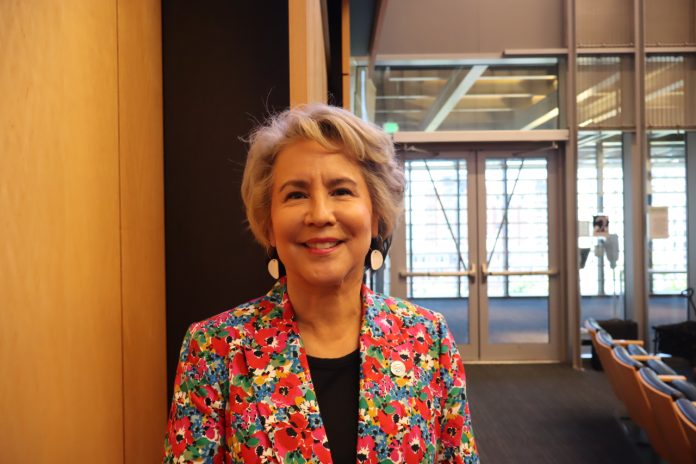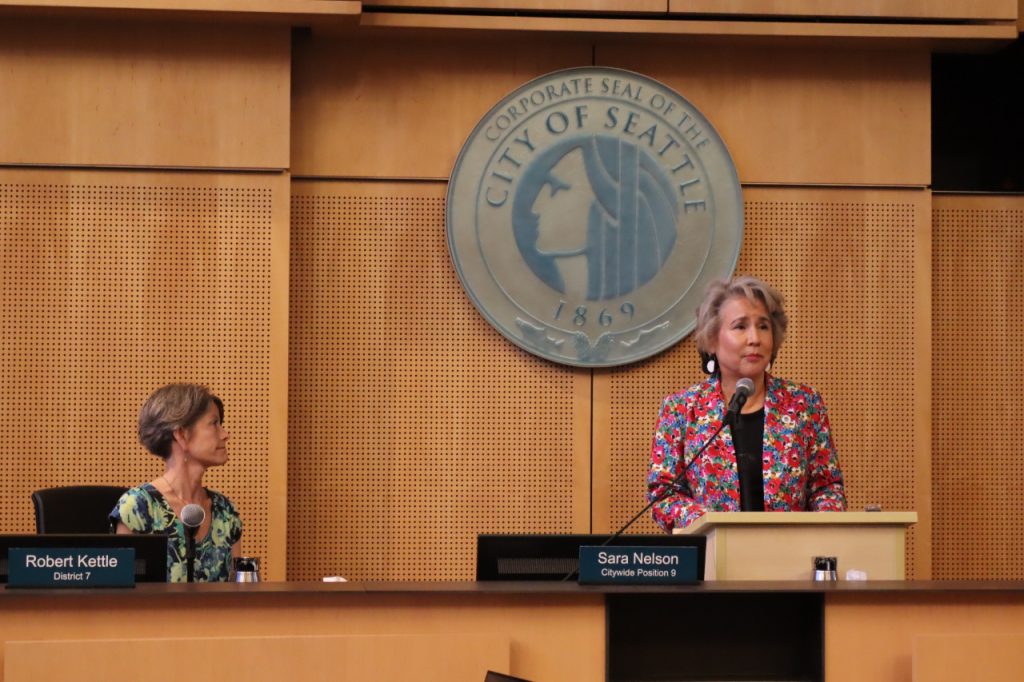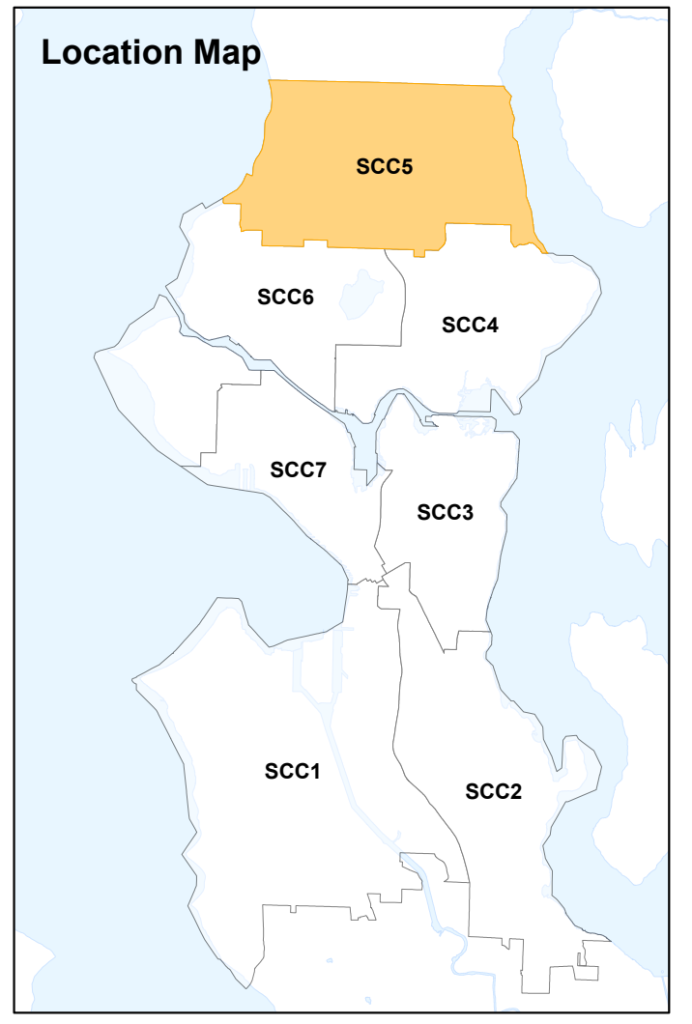
To fill a vacancy created by the resignation of Councilmember Cathy Moore, the Seattle City Council today appointed Debora Juarez, the former city councilmember who represented North Seattle’s District 5 from 2016 to 2023 and served as Council President in 2022 and 2023. Juarez had appeared the obvious favorite, given her eight years of direct job experience and ideological compatibility with Council’s centrist majority.
Moore handily won election in 2023, but served for just over 18 months. Juarez will hold the seat until a replacement can be selected by District 5 voters in November of 2026. That gives her a 16-month term.
Juarez was selected from a slate of six finalists that included former D5 candidate and progressive favorite Nilu Jenks and Julie Kang, a leader in Seattle’s business and educational spheres. Kang emerged late as an alternative choice who was seen as more business-friendly than Juarez, with the Seattle Times Editorial Board pushing for a “fresh face” to fill the seat.
But in the end, Juarez quickly received the requisite votes in just one round of voting. She garnered seven of eight votes, with citywide Councilmember Alexis Mercedes Rinck the sole dissent, backing Jenks.
Coming onto a council where the senior-most member (Dan Strauss) had been elected only six years ago, Juarez won’t need much time for onboarding.
In her comments following her appointment, Juarez alluded to the added risk public officials take on in troubled times with increasingly belligerent politics, referencing the arrest of U.S. Senator Alex Padilla by Secret Service and FBI agents when he attended Homeland Security department secretary Kristi Noem’s Los Angeles press conference on June 13.
“I had one goal, and I meant it when I said it that I didn’t want to feel like a coward,” Juarez said. “That took emotion to feel brave and have confidence, because California Senator Alex Padilla, when he was thrown on the ground and handcuffed and he was screaming…”
In an interview shortly after being sworn-in, Juarez told The Urbanist that she does see her experience as an asset, but pushed back on a characterization of her new colleagues as being inexperienced. “Everyone who ran for office are adults. They ran an election, they ran hard campaigns and won it,” Juarez said. “I know the job. I know we have two budget cycles. I know what the budget deficit is. We have the Comp Plan, we’re looking at the B&O tax. I know how it works.”

Before even being sworn in, Juarez has already rankled public transit advocates, garnering pushback for describing the ability to take light rail as a “luxury” during a question and answer session with the rest of the council. Asked by Councilmember Rinck how potential appointees had traveled to the meeting, Juarez, who has multiple sclerosis (MS), cited physical limitations as a reason that she needed to have access to a car.
“I’m very cognizant that some people have to use a car, not everyone has the luxury of getting on light rail, especially if you have kids, but that’s how I got here,” Juarez said.
Asked by The Urbanist to clarify her statement, Juarez, who had previously served on the Sound Transit board of directors, doubled down, even as transit advocates pointed out that many people with disabilities are dependent on transit to get around.
“What I meant [by] luxury was because I have MS. A lot of us aren’t able to walk. I can’t walk to Northgate. I’m going to have to drive. I’m sorry that people who can ride bikes, who are able bodied all the time, can hop on a bus, can hop on a bike and hop on a scooter, can hop on light rail,” Juarez said.
But she did point to her own personal history as evidence that she knows what it’s like to be transit dependent. “I grew up poor in a reservation,” Juarez said. “I did not own a vehicle until law school, my second year, because I had to be a public defender and work and go to school at night and drive from Tacoma to Seattle.”
Juarez was generally a housing abundance vote, backing upzones during her first two terms on Council. However, on Monday, she pledged to largely defer to Moore’s policy direction on the upcoming Seattle Comprehensive Plan votes that will guide the next 20 years of growth in Seattle. Moore has been Council’s loudest anti-growth voice over the past year, seeking to exclude her neighborhood of Maple Leaf from the “neighborhood centers” growth plan.
Juarez seemed to indicate she would support Moore’s proposed amendments to the Comp Plan. With a deadline of earlier this month to submit potential changes, Juarez will not be able to directly propose her own amendments.
“I want to defer to Councilmember Moore, because I really, really, really like Councilmember Moore,” Juarez told The Urbanist. “We’ve been friends for many years. We were former public defenders together. I supported her, and I trust that she obviously represented District 5, and her sensibilities were in there.”

Another important topic quickly coming up on Council’s docket is the a proposal to restructure the business and occupation (B&O) tax, dubbed the Seattle Shield Initiative. Proposed by Rinck and Mayor Bruce Harrell, the revised tax would raise an estimated additional $90 million annually while exempting 90% of small businesses. This would aid in addressing a budget deficit last pegged at $150 million for next year, which appears likely to grow as the impact of federal cuts come to bear.
Juarez expressed a cautious leaning of support, noting the B&O tax proposal meets two criteria she prefers, which is for a tax to go before voters and to have a sunset date.
“I’m sure I’m gonna move towards that way,” Juarez told The Urbanist. “I’m inclined, because it does have those two things that I would always ask in any piece of legislation when we’re looking at taxation.”
Juarez was one of two votes against the Jumpstart Payroll Expense Tax in 2020, a councilmanic tax that didn’t first go before voters, but has proven popular in public opinion polling nonetheless. While the payroll tax is favored by voters, it did rile the Seattle Metropolitan Chamber of Commerce, which unsuccessfully sued to block the tax.
Similarly, the Chamber has come out against the Seattle Shield Initiative as currently constituted, opposing the higher tax rate on larger businesses. Juarez’s vote — even in the face of chamber opposition — may prove essential to send the tax to voters. Council President Sara Nelson has been noncommittal and sought additional business outreach before advancing the tax reform.
Juarez will take over Moore’s committee assignments, which include chairing the Housing and Human Services Committee. The committee recently had a dustup over fill-in chair Mark Solomon’s move to fill 10 empty Seattle Renters Commission seats that Moore had refused to fill and kept vacant for her 18 months as chair. Moore had pushed to install landlords on the commission rather than continue viewing the committee as a voice of tenants, exclusively, as had been its original charter.
Juarez will also serve as vice chair of the Sustainability, City Light, Arts and Culture Committee, as well as on the Land Use Committee and the Libraries, Education, and Neighborhoods Committee.



